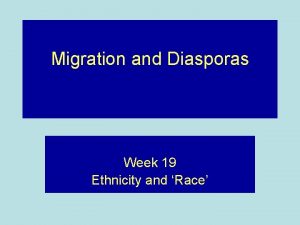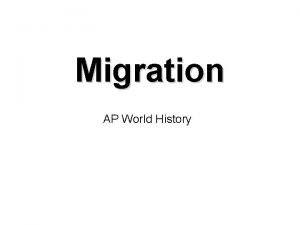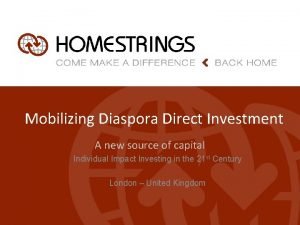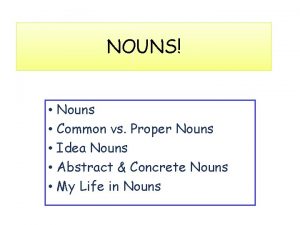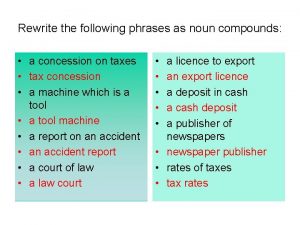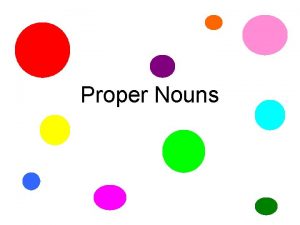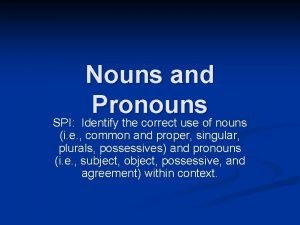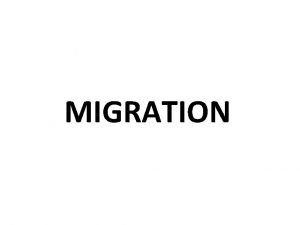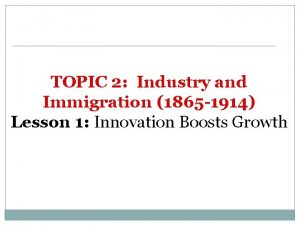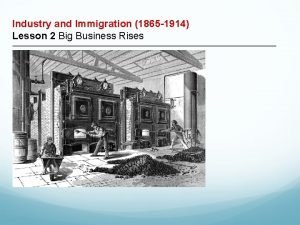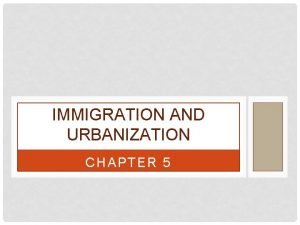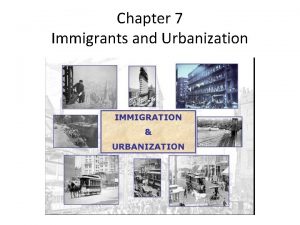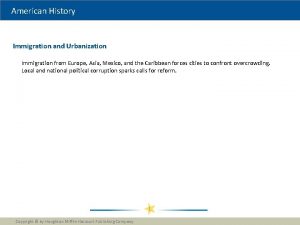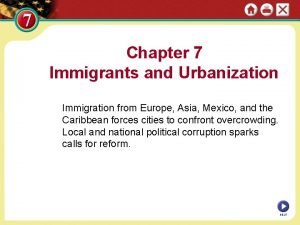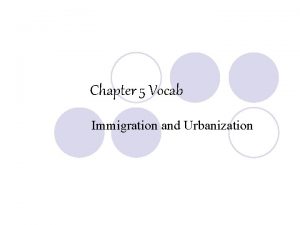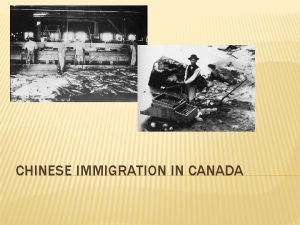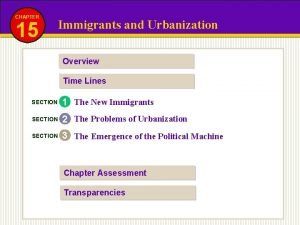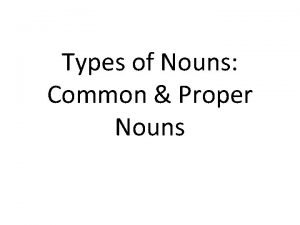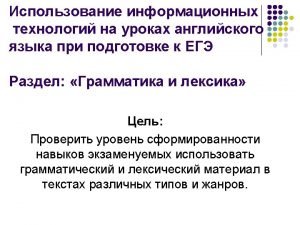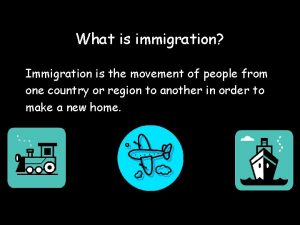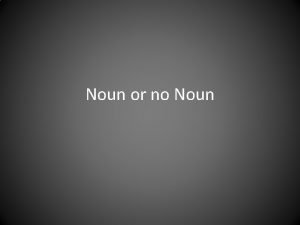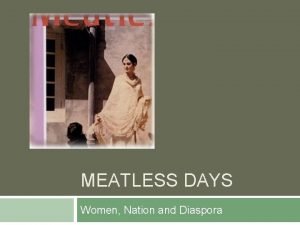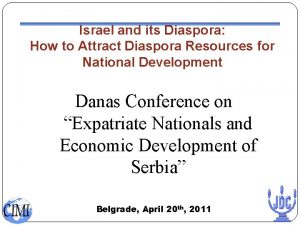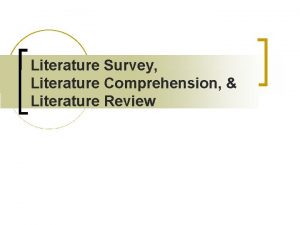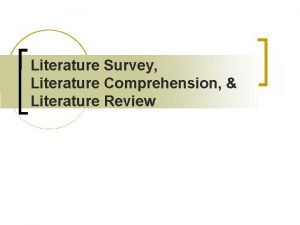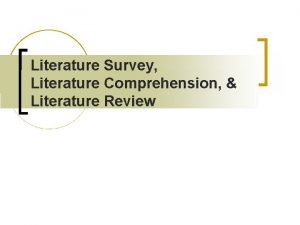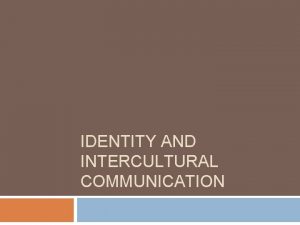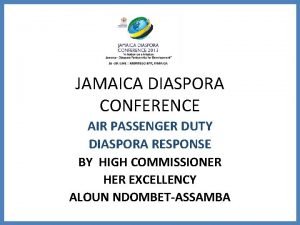Diaspora Immigration and Identity Intercultural Literature Diaspora noun







































- Slides: 39

Diaspora, Immigration and Identity Intercultural Literature

Diaspora noun. A large group of people with a similar heritage or homeland who have since moved out to places all over the world. • people settled far from their ancestral homelands 02/19/13

Diaspora in context… An impressively researched and documented collection of the finest thought produced by writers throughout the African Diaspora. A magnificent achievement. - Henry Louis Gates Like many of my friends in the Pakistani diaspora - and many of my friends in Pakistan itself, for that matter - I have sometimes looked at the country of my birth and wondered whether its future will be one of steady and sad decline. - Mohsin Hamid The Indian diaspora is a wonderful place to write from, and I am lucky to be part of it. - Kiran Desai

Transnationalism A social phenomenon and scholarly research agenda grown out of the heightened interconnectivity between people and the receding economic and social significance of boundaries among nation states. 02/19/13

Globalization • The process in which people, ideas and goods spread throughout the world, spurring more interaction and integration between the world's cultures, governments and economies.

Immigration * The action of coming to live permanently in a foreign country. • Immigrant: a person who comes to live permanently in a foreign country.

Emigrate vs Immigrate • Emigrate: The process of leaving one's country to live in another. Immigrate is to come into another country to live permanently. • “Poor Latin American youth feel forced to emigrate for a better future. ” • Immigrate: The process of coming to live permanently in a foreign country. • “Chinese families began to immigrate to California through the Port of San Francisco. ”

Refugee * A person who flees for refuge or safety, especially to a foreign country, as in time of political upheaval, war, etc.

Asylum * The protection granted by a nation to someone who has left their native country as a political refugee.

Amnesty • The act of an authority (such as a government) by which pardon is granted to a large group of individuals

Permanent Resident • The status of a person authorized to live and work in the United States of America permanently. Informally known as holding a “green card. ” • The person is not afforded the rights and protections of a US citizen (i. e. , voting).

Visa * An endorsement on a passport indicating that the holder is allowed to enter, leave, or stay for a specified period of time in a country.

Citizenship • The state of being vested with the rights, privileges, and dutie s of a citizen; a native or naturalized person who owes allegiance to a government and is entitled to protection from it. • Birth Right: the citizenship granted to a person by virtue of the circumstances of his/her birth. Accordingly, any person born within the territory of the U. S. is granted citizenship by birth. A child born overseas to U. S. citizens also acquires a U. S. citizenship. 02/19/13

Naturalization • The process by which a foreign citizen becomes a citizen of a n ew country. • Requirements for naturalization in the United States include residency for several years, ability to communicate in English, demonstrated knowledge of American history and government, and a dedication to American values. No membership in subversive organizations, such as ISIS or the Communist Party.

Illegal Alien * (US legal definition) Also known as an Illegal Immigrant, Undocumented Alien, or Undocumented Immigrant, is a person who has entered the United States illegally, has fallen "out of status, ” and is deportable if apprehended.

Xenophobia • Intense or irrational dislike or fear of people from other countries.

Demography * The study of statistics such as births, deaths, income, or the incidence of disease, which illustrate the changing structure of human populations.

Push vs Pull • Push Factor: a negative aspect or condition that motivates one to leave one's country (i. e. , war, famine, poverty, persecution, etc. ). • Pull Factor: a positive aspect or conditions of a country that attracts immigrants (i. e. , economic benefit, stability, freedoms, etc. ).

Pejoratives • Wetback • Chink • FOB • WOP • Ginney • Kike • Anchor babies • Illegals

Assimilation What do you know of assimilation? In what context have you heard this word used? What does it mean?

Assimilation • To become similar to one’s environment. • The social process of absorbing one cultural group into harmony with another.

Trivia In the history of the United States, what metaphor as been used to describe the process of assimilation of immigrants?

The Melting Pot

Melting Pot defined… A metaphor for a heterogeneous society becoming more homogeneous, the different elements “melting together” into a harmonious whole with a common culture. Usage of the term traced back to 1782 in the writings of J. Hector St. John de Crevecoeur in his “Letters from an American Farmer. ” Popularized in 1908 after the premiere of the play, “The Melting Pot” by Israel Zangwill. In 1912, R. W. Emerson described America as the Utopian product of a culturally and racially mixed “smelting pot, ” and explicitly welcomed the racial intermixing of whites and nonwhites – controversial for his time. Published in various subsequent works, the metaphor became popularized.

Expectations of Assimilation Adopt the new, lose the old. Lose the native language Lose the native “look” Adopt English “Look” American



Inherent Contradictions Racial divisions and the prevention of miscegenation. “Whiteness” associated with being an American. Some immigrant groups assimilated easier than others. Assimilation was ambivalent. . . The coexistence of opposing attitudes or feelings toward a person, an object, or an idea.

Is the United States a melting pot? Should the United States be a melting pot?

Trivia In the United States, what Latin phrase is historically used to describe the idea of assimilation?

E pluribus unum “Out of many, one. ” The motto located on the Seal of the United States:

Trivia What alternate metaphor was proposed by multiculturalists in response to the Melting Pot?

Salad Bowl

Acculturation The exchange of cultural features that results when groups of individuals having different cultures come into continuous first hand contact; the original cultural patterns may be altered, but the groups remain distinct (Kottak, 2007).

Assimilation vs. Acculturation

Who are we? 02/19/13

Reactionary Movements 1980’s - social scientists primarily in sociology, anthropology, and education pushed social reforms. Pluralism When smaller groups within a larger society maintain their unique cultural identities, and their values and practices are accepted by the wider culture. Multiculturalism The acceptance or promotion of multiple ethnic cultures, applied to the demographic make-up of a specific place, usually at the organizational level, e. g. , schools, businesses, neighborhoods, cities, or nations. Advocacy of cultural equality. Interculturalism The philosophy of exchanges between cultural groups within a society, primarily through dialogue. Intercultural Competence The ability of successful communication with people of other cultures.

Melting Pot or Salad Bowl? In your opinion, which metaphor is most appropriate to describe the United States today? Do you have an alternate metaphor to offer?

 Collective noun beginning with b
Collective noun beginning with b Types of diaspora
Types of diaspora Diaspora grega
Diaspora grega Periodos da história grega
Periodos da história grega Xenolasia
Xenolasia Diaspora grega
Diaspora grega Diaspora ap world history
Diaspora ap world history Diaspora start up
Diaspora start up Diaspora direct investment
Diaspora direct investment Personal identity map
Personal identity map Lesson 2 nouns proper common and collective answer key
Lesson 2 nouns proper common and collective answer key Proper noun of city
Proper noun of city Common and proper nouns project
Common and proper nouns project Proper idea nouns
Proper idea nouns Rewrite the sentences using apposition
Rewrite the sentences using apposition A proper noun names
A proper noun names Common and proper noun
Common and proper noun Example of noun clauses
Example of noun clauses Emigrated vs immigrated
Emigrated vs immigrated Topic 2 industry and immigration
Topic 2 industry and immigration Industry and immigration lesson 2
Industry and immigration lesson 2 Lesson 2 big business rises
Lesson 2 big business rises Chapter 5 immigration and urbanization
Chapter 5 immigration and urbanization Chapter 7 building vocabulary immigration and urbanization
Chapter 7 building vocabulary immigration and urbanization Chapter 7 building vocabulary immigration and urbanization
Chapter 7 building vocabulary immigration and urbanization Transcontinent
Transcontinent Chapter 7 building vocabulary immigration and urbanization
Chapter 7 building vocabulary immigration and urbanization Chapter 5 immigration and urbanization
Chapter 5 immigration and urbanization Chinese immigration to canada push and pull factors
Chinese immigration to canada push and pull factors Chapter 15 building vocabulary immigration and urbanization
Chapter 15 building vocabulary immigration and urbanization Technology and intercultural communication
Technology and intercultural communication Proper nouns vs common nouns
Proper nouns vs common nouns John collects money
John collects money Complete the table verb noun
Complete the table verb noun Noun phrases
Noun phrases Compound nouns kitchen
Compound nouns kitchen Takes the place of a noun or noun phrase
Takes the place of a noun or noun phrase Common and proper nouns powerpoint
Common and proper nouns powerpoint What is the immigration
What is the immigration What is immigration
What is immigration

